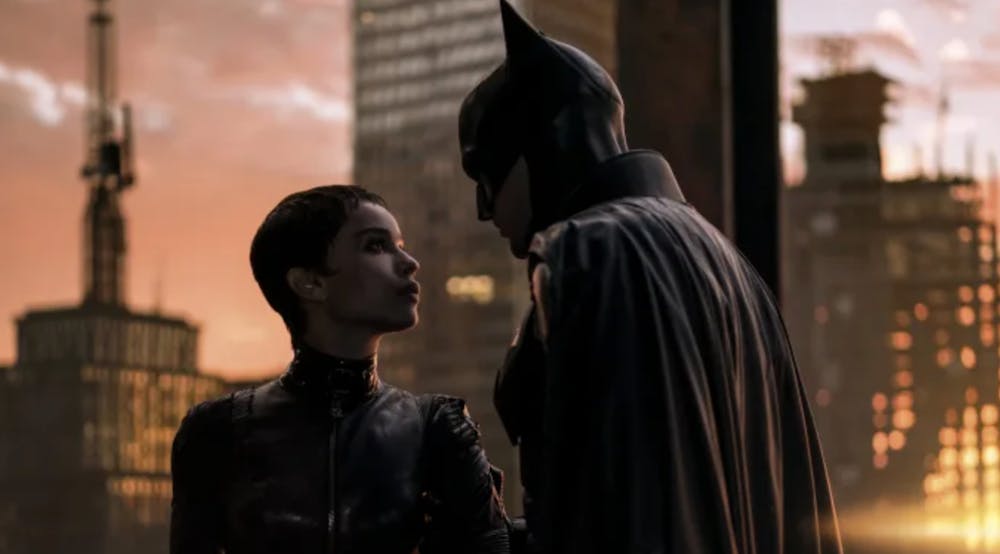Even before the blood-red title card, the oppressive aura of Gotham City in Matt Reeves’s new adaptation of Batman to the big screen is immediately apparent. This is a Gotham that feels real, dark and violent, with corrupt and maniacal figures looming everywhere. Simply put, “The Batman” is excellent, with near-perfect casting, stunning cinematography, deft comic adaptation and shrewd directorial decisions. This is a film that treats its world with sincerity and takes subject matter, which is an emotionally scarred billionaire vigilante punching criminals, with the utmost care. Never before has there been a better big-screen adaptation of the “world’s greatest detective.”
Audiences have been waiting for this film for years. Originally set to be directed by Ben Affleck with Affleck starring in the titular role, the final product sees Robert Pattinson as Bruce Wayne. Pattinson is magnetic, with a quiet and vengeful presence that leaps off the screen. In an interview with Entertainment Weekly, Pattinson says he based much of his portrayal off of the “Batman: Shaman'' comic run, which depicted the Dark Knight as a force of nature in the suit. Indeed, Pattinson’s Batman is imposing and nearly unstoppable, yet is also the source of comedic levity through his interactions with Jim Gordon and his butler Alfred, played by Jeffrey Wright and Andy Serkis, respectively.
Our heroes find themselves set against an immovable web of corruption in Gotham, spreading across all levels of society and into the past. Batman and Gordon work together, a classic good cop–bad cop pairing, to combat the ubiquitous mob, headed by the silently menacing Carmine Falcone, played by John Turturro, and the Penguin (Oswald Cobblepot), realized by an almost unrecognizable Colin Farell. Adding to the rouges’ gallery is Paul Dano’s deranged and scarily realistic interpretation of The Riddler, who acts as a serial killer and online hate group figurehead. Rounding out the main cast is Zoe Kravitz’s Selena Kyle (Catwoman), who is more than a match for her costars and delivers the most accurate portrayal of Catwoman yet adapted in a major release.
Reeves, in collaboration with co-writer Peter Craig, draws from a variety of Batman stories to create his new interpretation of the character. From the realm of comics, there are the references to “The Long Halloween,” with a string of murders beginning on Halloween, and aspects of “Batman: Year One,” as this Dark Knight is in his second year of crimefighting, and has yet to truly establish his partnership with the GCPD or grown past his mission of inflicting vengeance upon evildoers. In the characterization of The Riddler as a maniacal serial killer, elements of the “Batman: Hush” stories can be seen, especially in the ways that The Riddler treats his victims and the detective aspects of Batman’s search for him. Influences of other Batman films like Christopher Nolan’s “The Dark Knight” are noticeable, with the interweaving conflicts against organized crime and a more sensational villain and the ways that the two conflicts collapse inward in the climax. However, despite all of these influences, “The Batman '' manages to tell its own story and establish a very grounded take on Batman, that, through minor suspension of belief, one could imagine existing in reality.
The new Gotham City is a dark and oppressive environment. Throughout the film, we rarely see the sunlight, and if we do it is either at dawn or dusk, which make for stunning silhouettes. The camera pans slowly, with longer holds during the sporadic action scenes. Long gone are the quick cuts of “Batman Begins” and other mid-2000s action films, as they have been replaced with contemplative and methodical camera work. The film’s length, nearly three hours, gives Reeves enough time to let his city fester and the audience understand the despair faced by most of her residents. Adding to this dark tone is the film’s score, composed by Michael Giacchino. Rather than attempting to recreate the bombastic score of 1989’s “Batman,” composed by Danny Elfman, or Hans Zimmer’s work with the Nolan Trilogy, Giacchino works with a few melodic fragments to create a brooding and melancholic soundscape. The main motif, which I take to represent Gotham and fear within, is a descending figure that repeats and crescendos as the film’s tension rises, while there is also a more overt “love theme” for scenes with Selena Kyle, as well as interpolations of Franz Schubert’s “Ave Maria” and Nirvana’s “Something in the Way” that blend with the main descending motif as it explores new variations.
Despite its long runtime, “The Batman” is not bogged down by its ambition in telling a faithful and new Batman story. This is the darkest Batman film yet, both in its visuals and its narrative. Through its stellar cast, effective if more minimalist score, and smart adaptations of source material, Reeves’s film manages to meet its high expectations. There are already talks of sequels and HBO Max spinoff series with this particular incarnation of Gotham, further demonstrating the excellence of the new film. While time will tell if critical and audience reviews of the new film will place it above seminal works such as “The Dark Knight,” this is the most faithful Batman adaptation movie audiences have seen.
Get The Chronicle straight to your inbox
Sign up for our weekly newsletter. Cancel at any time.

